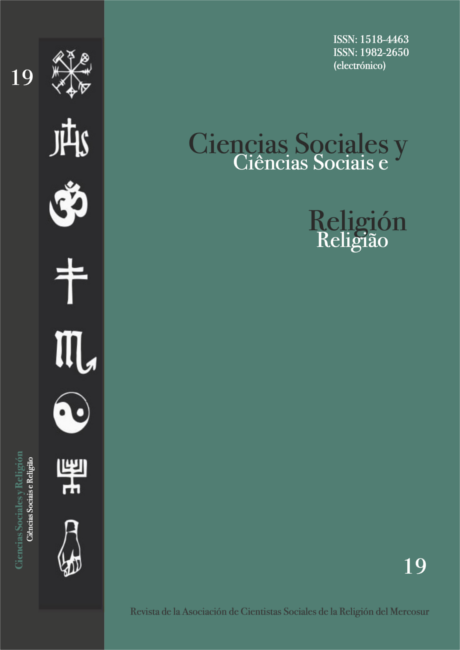Abstract
The article aims to explore a series of dimensions related to the treatment offered from a particular alternative medicine: foot reflexology. In particular, the way in which the interpretative matrices around corporality end up outlining a diagnosis-treatment in which two opposing dimensions coexist is analyzed. First, a logic of objectivist aspirations that is forged in the recognition of a certain linearity between the actions of the therapist and the response of the body. Second, a multiple and relational logic that places us at the level of "body reasons", which refers to the existence of a non-controllable margin in therapy that neither the specialist nor the user can predict. The interest of this work lies in the understanding of the cosmovisional supports of alternative medicines and the margins that enable processes of transaction of senses with other symbolic, religious or medical systems.
References
AMARAL, Leila. Um espírito sem lar. Sobre uma dimensão ‘nova era’ da religiosidade contemporânea. Circuitos infinitos. Comparações e religiões no Brasil, Argentina, Portugal, França e Grã-Bretanha. São Paulo: Attar Editorial, 2003.
ASTIN, J.A. Why patients use alternative medicine? Results of a National Study. JAMA; n. 279, p.1548-1553, 1998.
AUGÉ, Marc. Dios como objeto. Símbolos-cuerpos-materias-palabras. Barcelona: Gedisa, 1996.
BAER, Hans. Toward an Integrative Medicine: emerging alternative therapies with biomedicine. Walnut Creek, CA: Altamira Press, 2008.
BARRY, Christine. The role of evidence in alternative medicine: Contrasting biomedical and anthropological approaches. Social Science & Medicine, n. 62, p. 2646–2657, 2006.
CANT, Sarah; SHARMA, Ursula (Orgs.). Complementary and alternative medicines. Knowledge in practice. London: Free Association Books, 1996.
CAROZZI, María Julia. Nueva Era y terapias alternativas. Construyendo significados en el discurso y la interacción. Buenos Aires: Ediciones de la Universidad Católica, 2001.
CARTWRIGHT, Tina; TORR, Rebecca. Making sense of illness: The experiences of users of complementary medicine. Journal of Health Psychology, vol. 10, n. 4, p. 559-572, 2005.
FADLON, Judith. Negotiating the holistic turn: the domestication of alternative medicine. Albany, NY: State University of New York, 2005.
FEATHERSTONE, Mike. Cultura de consumo y posmodernismo. Buenos Aires: Amorrortu, 2000.
FREIDIN, Betina; ABRUTZKY, Rosana. Transitando los mundos terapéuticos de la acupuntura en Buenos Aires: perspectivas y experiencias de los usuarios. Documento de Trabajo Instituto de Investigaciones Gino Germani, n. 54, Buenos Aires: Universidad de Buenos Aires, 2010.
FRIGERIO, Alejandro. Estableciendo puentes: articulación de significados y acomodación social en movimientos religiosos en el Cono Sur. Alteridades, año 9, n. 18, 1999.
GOOD, Byron. Medicine, rationality and experience. Cambridge: Cambridge University Press, 1994.
JOHANNESSEN, Helle. Individualised knowledge: reflexologists, biopaths and kinesiologists in Denmark. En: CANT, Sarah; SHARMA, Ursula (Orgs.). Complementary and alternative medicines. Knowledge in practice. London: Free Association Books, 1996. p. 114–132.
LAPLANTINE, François. Antropología de la enfermedad. Buenos Aires: Ediciones del Sol, 1999.
LAUNSØ, Laila. Integrated medicine- a challenge to the health-care system. Acta Sociologica, n. 32, p. 237-251, 1989.
POWER, Richenda. ’Only nature heals’: a discussion of therapeutic responsibility from a naturopathic point of view. En: BUDD, S.; SHARMA, U. (Orgs.). The Healing Bond. The patient-practitioner relationship and therapeutic responsibility. Londres: Routledge, 1994.
SAIZAR, María Mercedes. La práctica del yoga. Relatos de usuarios en Buenos Aires. Mitológicas, vol. XVIII, p. 29-59, 2003.
SAIZAR, María Mercedes. De Krishna a Chopra. Filosofías y prácticas del Yoga en Buenos Aires. Buenos Aires: Antropofagia, 2009.
SAKS, Mike. Alternative medicine and the health care division of labour: Present trends and future prospects. Current Sociology, n. 49, p. 119-134, 2001.
VIOTTI, Nicolás. Entre el cuerpo y el alma. Enfermedades graves y terapias ‘holistas’ entre sectores medios de Buenos Aires. En: IDOYAGA MOLINA, Anatilde (Comp.). Los caminos terapéuticos y los rostros de la diversidad. Buenos Aires: Prensa del IUNA, 2007. p. 175-195.

This work is licensed under a Creative Commons Attribution-NonCommercial-ShareAlike 4.0 International License.
Copyright (c) 2020 Mariana Bordes
